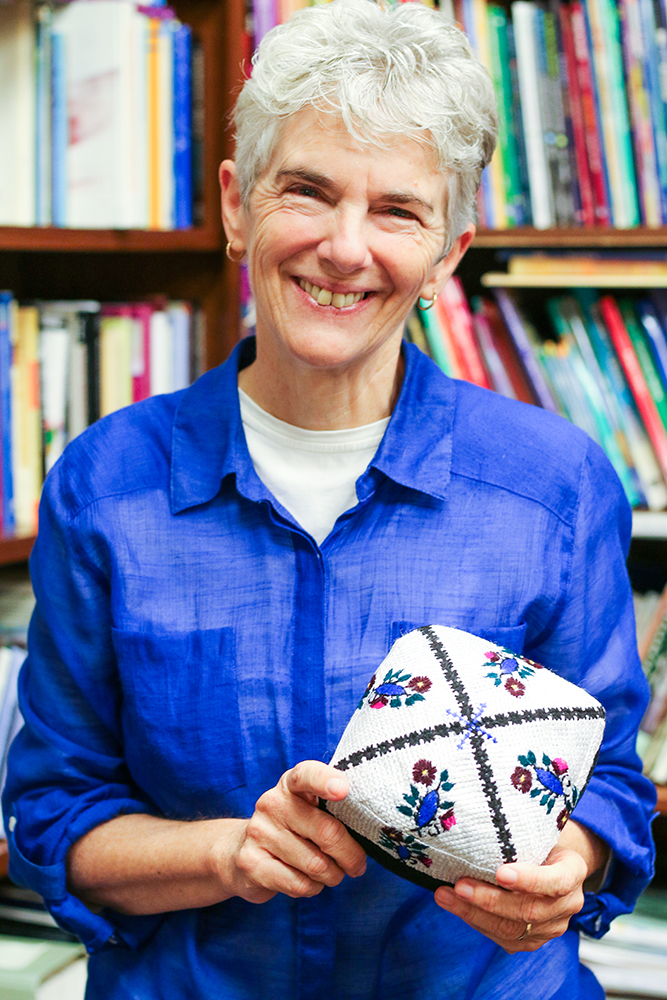University-level English professors across the country apply year after year for the privilege to instruct foreign English teachers through an organization called the Fulbright Scholar Program. In other words — Purgason’s scholarship is very similar to Biola’s branch of the Teaching English to Speakers of Other Languages international program, but set overseas and federally-funded.
An incredible opportunity
Professor of TESOL Kitty Purgason applied for her third Fulbright scholarship with hopes for an opportunity to serve another country in the name of communication and goodwill between nations. Fulbright granted her the incredible opportunity — to the excitement of her family and co-workers — of serving teachers in Tajikistan, a central Asian country she had visited years prior. She had previously served in Turkey in 1986 and Turkmenistan in 1996, instructing teachers of the best ways of educating pupils in a language she loves.
Fulbright supports three branches of scholarship: students, recent graduates and faculty. Purgason has applied for the faculty scholarship thrice as of the summer of 2016, and won it all three times.
“Fulbright changed their regulations and allowed for a third application… My kids are grown, I have a sabbatical coming up. So I hopped on it again, and this time, they’re sending me to Tajikistan,” Purgason said. “For this third one, I applied to a number of different countries and I think the reason they offered me a position [in] Tajikistan is because I had been there before.”
Passionate connectivity
The program only offers the scholarship at the higher academic level to scholars who have proven their intercultural competency. Monica Cure, Torrey Honors Institute professor, received the Fulbright student scholarship as a recent graduate from her undergraduate school, Kenyon College in Ohio. Though she graduated years ago, she recalls her college experience, as well as the Fulbright trip, with clarity.
“They’re just looking for people who have demonstrated that they know how to be interculturally competent in general. Then if you have specific knowledge for this country and have a passion for this country and some experience with this country, you just know you’re going to connect better there,” Cure said. “I went to Romania, which is actually where I was born.”
Cure explained Fulbright offers so many unique opportunities, she hopes Purgason will take advantage of them. In Romania, Cure had the rare chance to teach a course in poetry, while translating Romanian poets into English.
“The great thing about the Fulbright — and I’m sure Dr. Purgason will take full advantage of that — so many doors open up. So, while I was there I ended up translating a contemporary poet, which was fun. We met through the Fulbright and I liked her poetry, so I was like, ‘Sure, I will translate that,’” Cure said.
Generosity and providence
Katrina Greene, professor of anthropology and ICS, also highly recommends Fulbright opportunities, having experienced them firsthand herself. She has only praises to give the organization, acclaiming them for their dedication to generosity and providence in giving their scholars what they need to succeed overseas. Greene worked hands-on with the University of West Cape in South Africa for the fieldwork aspect of her doctorate dissertation in Anthropology.
“I had a wonderful experience with Fulbright. I have nothing but positive things to say about the support that they provided me,” Greene said.
Opportunities flow for both students and faculty through Fulbright scholarships. International teaching through the program is offered to recent graduates who desire to gain experience in interacting with various cultures as well as practically aiding a teacher in a foreign classroom.
“The [undergraduate scholarship] is the one I really want Biolans to be aware of, because it is for recent college graduates. It’s called the English Teaching Assistant grant. And they send recent college graduates all over the world — including to Tajikistan — to spend a year helping a local teacher teach English,” Purgason said.
Purgason admits to the trip’s true purpose: spreading goodwill toward the United States through helping other countries in academia and promoting scholarship. She understands she must perform her duties in such a way that foreign nations develop a better understanding of the services the United States can provide to the world.
Because the scholarship is federally-funded, Purgason knows adequately representing the U.S. remains her primary duty. The scholarship is “administered by the Bureau of Educational and Cultural Affairs of the United States Department of State under policy guidelines established by the J. William Fulbright Foreign Scholarship Board,” according to the Fulbright website, meaning the government supports the trip and expects to send competent ambassadors.
“They believe that exchange with people from around the world coming to the U.S. as scholars, and scholars from the U.S. going around the world… is going to create goodwill for the United States, so it’s in our government’s interest, and it just [generally] creates mutual understanding,” Purgason said. “Now, at the same time, as a Christian, I believe that every Christian, no matter where they’re working, is a witness — to who Jesus is and to what God’s heart is — to all of the world… Wherever I am, I’m a witness.”







